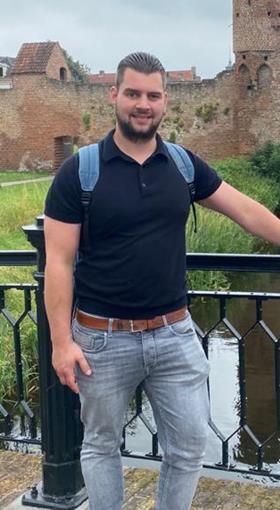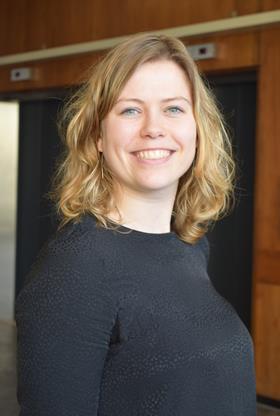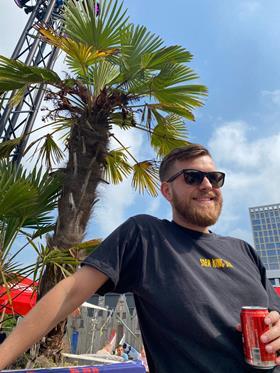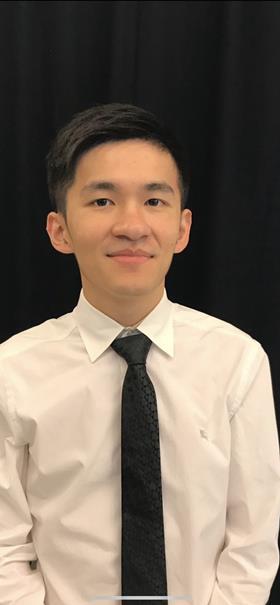For many university students, it may seems like the only option: after your master’s you ‘must’ do a PhD, otherwise your chances on the labour market are limited. But nothing could be further from the truth, as four master’s graduates show.
There are plenty of opportunities to do something else after your master’s degree. ‘People who contradict this have not applied for enough jobs.’

‘Doing a PhD is hard work for a diploma that sometimes is and sometimes isn’t of value‘
Paul ten Bras studied molecular sciences at the Free University of Amsterdam and the University of Amsterdam, a joint degree. Before that, he did a bachelor’s degree at Leiden University. He has been working at Katwijk Chemie for over half a year as an R&D employee and pilot plant operator, conducting research into known active pharmaceutical ingredients to see if they can make those themselves.
What was the reason you didn’t choose to do a PhD?
‘There wasn’t necessarily a substantive reason. I just didn’t want to move for a PhD position. I did look into it, but unfortunately there were no places available in my area. Moreover, obtaining a PhD is quite hard work for a diploma that sometimes is and sometimes isn’t of value to the business world; so it’s more something you’d do for yourself and not necessarily for your career. But then again, maybe if I had tried, it would have been fun. With a company you have limited possibilities, and uni has its charms as well.’
Do you think your education fits in well with your current workplace?
‘Yes, I have learned to think analytically. Of course you don’t have all the tools you need when you have just graduated, but you do get a basis you can work with. That is more than enough. The knowledge of molecules and looking up literature is there, and that’s really all you need.’
Did you learn the difference between a PhD and for company during your studies?
‘Not in class, but you talk to people along the way. I had some internships at both the university and a company, so then you learn the difference through experience. You talk, you listen, you read.’
What advice would you give students who are still hesitating between a PhD and working for a company?
‘It is important to talk to people who work where you would like to work and to ask about their experience. If you are in doubt, you should at least go and have a look at both. Along the way you will feel whether it suits you, especially when you get further into your application process. It can do no harm to apply to several places. The introductory interview often makes it clear whether this is really something for you.’

‘My graduation project in the lab confirmed that carrying out a project on my own was not my preference’
Maxime Bisschops studied biochemical engineering at Delft University of Technology and started work as a process technologist with Shell more than two years ago.
What was the reason you didn’t choose to do a PhD?
‘My study was very research-oriented and I spent a lot of time in the lab. However, I always got the most enjoyment out of courses where I got to work designing or optimising processes on a large scale. My graduation project in the lab confirmed to me that leading and implementing a project on my own was not my preference. So a PhD in my field wouldn’t have been a good choice.’
Do you think your training fits in well with your current workplace?
‘The way of thinking and working that I was taught during my studies fits in well with my current workplace. The study courses focused mainly on subjects relevant to doing research in my field. Because I took many electives outside the normal programme at TU Delft, I was able to find my own way in them. Now that I’ve spent two years at Shell, I think it would have been better if more courses had been related to a job in the business sector.’
Did you learn the difference between PhD and business during your studies?
‘During my studies there was – unfortunately – never any concrete discussion about the difference between a job in academia and a job in the industry. I only discovered this during my final year of study when I was allowed to do an internship at a company.’
What advice would you give to students who are still hesitating between a PhD and working for a company?
‘Go and talk to former students of your study programme who are doing a PhD as well as former students who have started working for a company. In addition, a graduation thesis or maybe an internship in an academic or industrial environment can help you find out what you like.’

‘Immediately after graduating, I wasn’t mentally ready to do a PhD yet’
Maarten van Meerbeek received a bachelor’s degree from Avans University of Applied Sciences in Breda and a pre-master’s degree in chemistry from Leiden University, with a focus on research. Since 12 July, he has been working in the interventional molecular imaging group at the Radiology Department of the Leiden University Medical Centre. Officially as a research analyst, but practically as an organic chemist.
What was the reason you didn’t choose to do a PhD?
‘That’s a difficult question to answer, but I don’t think I was made for it. I find it difficult to work on the same thing for long periods of time. In the group where I’m currently working, my training is much broader and I get to deal with much more diverse aspects of chemistry.’
Do you think your training fits in well with your current workplace?
‘Yes, I am convinced of that. At work I am ‘just’ doing chemistry and synthesis, and that is my background. I also work a lot with HPLC and other analytical techniques that I didn’t use much during my master’s, but here I have the opportunity to grow in different directions. In any case, the level is not much higher than during my master’s.’
Did you learn the difference between PhD and business on your course?
‘Definitely. If you do a master’s with a practical internship, you help someone with their research. With a PhD you have to do that yourself. I think that is the crux of the matter: I would rather help someone than do it myself. I am learning to do it myself now, but immediately after my graduation I was not mentally ready to take on a PhD. But who knows, maybe that will come.’
What advice would you give to students who are still hesitating between a PhD and working for a company?
‘It might be very cliché, but follow your feelings. If you make the decision for a PhD or company too quickly while you know you’re not ready for it at all, you’re either done after a year or you’re stuck with something you don’t like for four years. You do a PhD mainly for yourself and not to prove anything. But there are plenty of opportunities to do something else after your master’s. People who argue with that, have not applied enough. I found my current job by word of mouth. But I also applied to other companies and they just called back. It is not as bad as people make it seem.’

‘You need a certain amount of luck for a PhD; I don’t like that feeling of insecurity at all’
After a bachelor’s degree in Molecular Science & Technology from Delft University of Technology/Leiden University, Lijie Pan completed a master’s degree in Chemical Engineering at Delft University of Technology. After his studies, he started working at Air Liquide as a Process Engineer.
What was the reason you did not choose to do a PhD?
‘I think I did not do it mainly because of the uncertainty factor. Embarking on a four-year PhD journey does not mean that you will always get what you signed up for: a nice dissertation, a doctorate, etc. Of course, the outcome of your PhD is probably mostly up to you, but not entirely; you need a certain amount of luck in your research. That feeling of insecurity does not suit me at all.’
Do you think your study programme connects well with the business world?
‘No, I thought there was too little focus on practice during my study. The emphasis was on theory and that part of my education was excellent, but I found the contact with companies in the regular tracks limited. Personally, I didn’t get to know much about how a chemical plant operates in practice and that’s a pity, of course, if that’s one of the largest employers for people with a chemical engineering background.’
Did you learn the difference between PhD and company on your course?
‘Yes, but mainly because you learn a lot about what doing a PhD entails rather than what the business world is like. During my studies I came into contact with doing a lot of research at the university and I was almost always supervised by PhD students or postdocs, so you automatically learn what a PhD entails. It is true that an internship – which is usually at a company – gives you a good idea of what you can expect when you start working for a company. That was also the case for me.’
What advice would you give to students who are still hesitating between a PhD and working for a company?
‘Make a well-considered decision and don’t let yourself be led in one direction beforehand. Talk to people from both sides. And I hope the above answers can help you a bit. Good luck!’













Nog geen opmerkingen